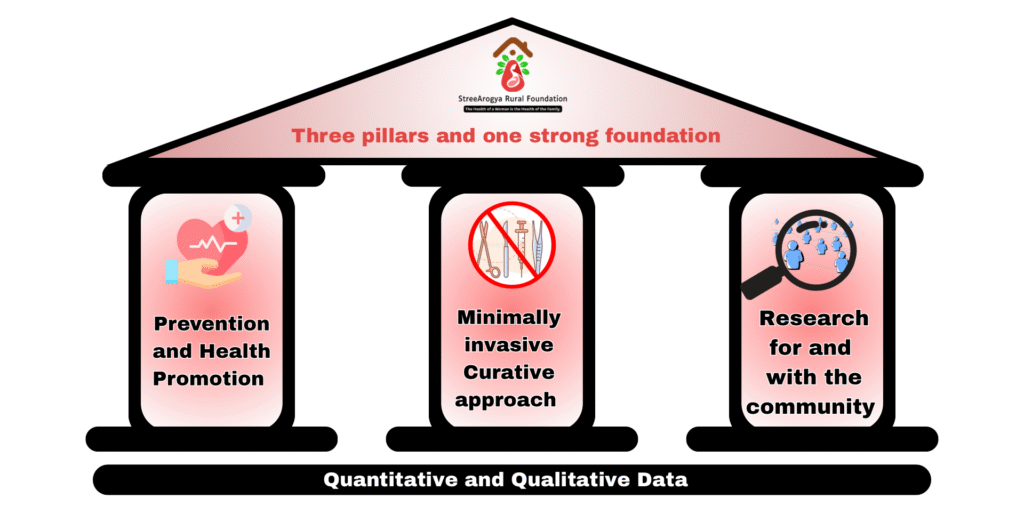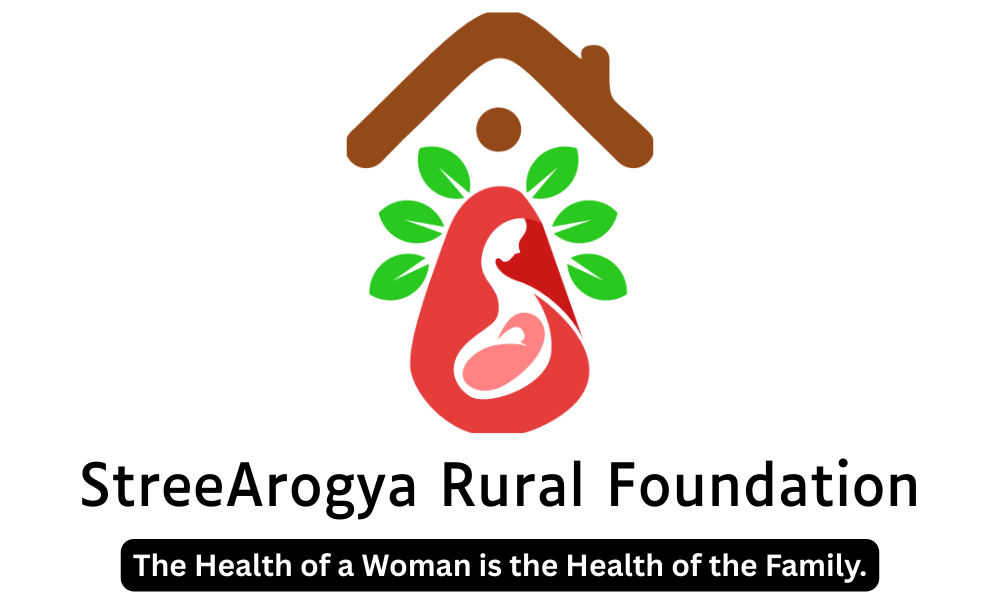Services
Home » Services
Our Services
Services through our Health center [Mangal Pratap StreeArogya Kendra]
- Primary healthcare
- Preventive healthcare
- Women's cancer screening
- Women's overall health
- Family health
- Antenatal care
- Postnatal care
- Care for pople with following :
- Family planning
- Incontinence
- Pelvic organ prolapse
- Infertility
- Polycystic ovarian syndrome
Services in the Community [Rural areas in North Solapur Taluka]
- Medical camps
- Health awareness sessions
- Health workshops
- Prioritization and planning with community
- School Health activities
- Short film screenings
- Guest lectures on health topics
- Community surveys
- Community needs assessment
- Attending community Bachatgat
- Attending Panchayat meetings
Our Healthcare Model

Our Guiding Framework
We are a nonprofit organization for rural women serving in the North Solapur Taluka, Solapur District, Maharashtra. We have been working in the region since 2022. The first pillar of SARF is ethical, evidence-based, comprehensive, and rational Healthcare with a special focus on preventive healthcare services and minimally invasive treatment options for women. The second pillar is community engagement using a participatory community approach. The third pillar is research, training, and collaboration with a strong foundation in data-driven action for change. We believe that timely, high quality, quantitative and qualitative data lay a strong foundation for our work.
Our Promise and Purpose
A commitment to healthier lives, guided by a vision of empowered women and thriving communities
Vision
To create a respectful, equitable, and safe space for rural women that would empower them and improve their health and well-being
Mission
To create a community engagement center that caters to preventive, rehabilitative healthcare and promote well-being aspects for rural women and a local health system network that facilitates their health care needs. To provide accessible minimally invasive preventive and therapeutic treatment options for diseases
Values
• Accountability
• Honesty
• Focus on Quality
• Respectful Inclusion
• Compassion
• Fairness
Why we do what we do?
Sustainable development goal (SDG) -3
Aligned with SDG 3 (Good Health & Well-being), our centre is committed to improving health outcomes for rural women in North Solapur through evidence-based interventions and technology-enabled care.
Barriers to Healthcare Access
Although public healthcare in India is free, rural women face poor quality of services, lack of trained staff, long distances, and inconvenient hours. Many rely on costly, unregulated private care, with 75% of total health expenses paid out-of-pocket. Transportation and financial constraints further restrict access.
Gender as a Determinant
Gender inequality deeply impacts women’s health. From sex-selective abortions to under-nutrition, lower hospital admissions, and limited use of antenatal and immunization services, women face discrimination at every stage of life.
Key Health Challenges
- Malnutrition & Anemia : Affecting 70% of women; linked to maternal mortality and child health.
- Maternal Health – India contributes to 20% of global maternal deaths; barriers include poor ANC coverage and delayed care.
- HIV/AIDS – Women form - 40% of cases; stigma and lack of condom use worsen risks.
- Family Planning & Abortion – 10% unmet need in rural areas; safe abortion access is limited.
- Infertility– Affects up to 17%; preventable STIs are a major cause.
- Cervical & Uterine Health – Low screening rates; minimally invasive treatments needed in rural setups.
- Cancers – Rising burden of breast, ovarian, and cervical cancer; early detection critical.
- Urinary Incontinence– Common but underreported; non-surgical outpatient solutions possible.
- Mental Health – Depression, violence, and social stigma affect large numbers; care remains neglected.
Maharashtra Context
Maharashtra has introduced progressive policies against child marriage, misuse of sex determination, and supports institutional deliveries (93%). Literacy among rural women is **76.9%**, and nearly half own a mobile phone—presenting opportunities for digital health outreach.
Conclusion
Improving rural women’s health requires tackling systemic gender inequalities, gaps in healthcare delivery, and lack of affordable services. With focused interventions in nutrition, reproductive health, cancer screening, and mental well-being, rural women in Maharashtra can access the care they deserve.

